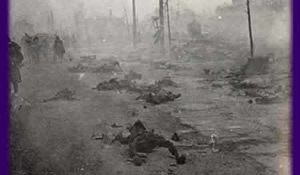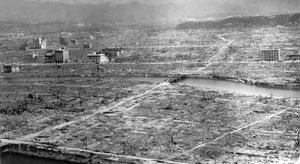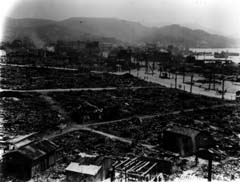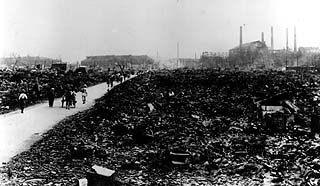One man’s reductio
Here’s widely-published, reportedly libertarian columnist Walter Williams on the need for political will in the War on Terror:
Does the United States have the power to eliminate terrorists and the states that support them? In terms of capacity, as opposed to will, the answer is a clear yes.
Think about it. Currently, the U.S. has an arsenal of 18 Ohio class submarines. Just one submarine is loaded with 24 Trident nuclear missiles. Each Trident missile has eight nuclear warheads capable of being independently targeted. That means the U.S. alone has the capacity to wipe out Iran, Syria or any other state that supports terrorist groups or engages in terrorism — without risking the life of a single soldier.
Terrorist supporters know we have this capacity, but because of worldwide public opinion, which often appears to be on their side, coupled with our weak will, we’ll never use it. Today’s Americans are vastly different from those of my generation who fought the life-and-death struggle of World War II. Any attempt to annihilate our Middle East enemies would create all sorts of handwringing about the innocent lives lost, so-called collateral damage.
Such an argument would have fallen on deaf ears during World War II when we firebombed cities in Germany and Japan. The loss of lives through saturation bombing far exceeded those lost through the dropping of atomic bombs on Hiroshima and Nagasaki.
— Walter E. Williams (2006-08-23): Will The West [sic] Defend Itself?
I’d like to thank Mr. Williams for helping to illustrate an important point about logical inference.
Two of the most important rules of inference are the modus ponendo ponens (p !!!@@e2;2020;2019; q. p. ∴ q) and the modus tollendo tollens (p !!!@@e2;2020;2019; q. ~q. ∴ ~p). Something that people often don’t realize is how the very same reasoning could be used to set up either a modus ponens or a modus tollens in the last step. Here’s an example drawn from real life. Walter Williams argues:
- If there were something wrong with slaughtering hundreds of thousands of innocent people in the name of military victory today, there would have been something wrong with the Allied governments’ massacre of half a million or more innocent people in the name of military victory during the firebombing campaigns of World War II. (lemma)
- There was nothing wrong with the Allied governments’ massacre of half a million or more innocent people in the name of military victory during the firebombing campaigns of World War II. (premise)
- Therefore, there must be nothing wrong with slaughtering hundreds of thousands of innocent people in the name of victory today. Q.E.D. (M.T. 1, 2)
But someone or another just might use the same line of inferences that Williams drew in order to establish a different conclusion:
- If there were something wrong with slaughtering hundreds of thousands of innocent people in the name of military victory today, there would have been something wrong with the Allied governments’ massacre of half a million or more innocent people in the name of military victory during the firebombing campaigns of World War II. (lemma)
- There is something wrong with slaughtering hundreds of thousands of innocent people in the name of military victory today. (premise)
- Therefore, there must be something wrong with the Allied governments’ massacre of half a million or more innocent people in the name of military victory during the firebombing campaigns of World War II. You dick. (M.P. 1, 2)
For some people’s argumentative purposes the Allied war effort in World War II is not so much just as the paradigm for justice itself; like the meter stick in Paris, it doesn’t even make sense to say that it is just, because the possibility that it even might have been less than just is simply unintelligible. Those who have a less reverent view of the single most destructive total war in the history of the entire world may not share the same premises. And thus may draw quite a different conclusion. I’m just sayin’.
I’d like to thank the War Party for offering yet another opportunity for an important lesson on informal logic.
Update 2006-09-02: Commenter Adam B. pointed out that the full Latin name for modus tollens is the modus tollendo tollens, not modus ponendo tollens as I’d originally written. This has been fixed in the text.
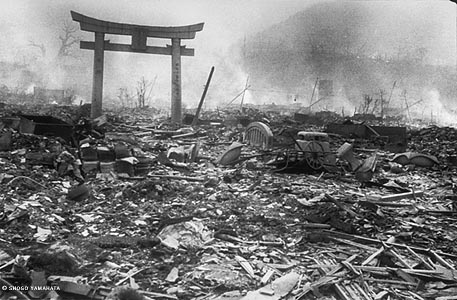
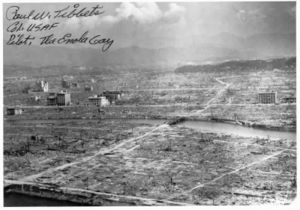 Sixty-one years ago today, at 8:15am in the morning, Thomas Ferebee, acting under the direct command of Paul Tibbets, on the orders of the United States government, dropped an atomic bomb over the city center of Hiroshima, Japan. When the bomb was dropped the city had a population of about 255,000 people. About 70,000–80,000 people were instantly killed by the shockwave, fireball, and radiation. By the end of 1945, tens of thousands more had died from their wounds, from radiation sickness, and from cancer related to the radioactivity. It’s estimated that about 140,000 people — more than half the population of the city — died in the nuclear massacre. The overwhelming majority of people killed were civilians: Hiroshima had only a couple of relatively unimportant military bases, and they were located on the edges of town, miles away from ground zero in the central city.
Sixty-one years ago today, at 8:15am in the morning, Thomas Ferebee, acting under the direct command of Paul Tibbets, on the orders of the United States government, dropped an atomic bomb over the city center of Hiroshima, Japan. When the bomb was dropped the city had a population of about 255,000 people. About 70,000–80,000 people were instantly killed by the shockwave, fireball, and radiation. By the end of 1945, tens of thousands more had died from their wounds, from radiation sickness, and from cancer related to the radioactivity. It’s estimated that about 140,000 people — more than half the population of the city — died in the nuclear massacre. The overwhelming majority of people killed were civilians: Hiroshima had only a couple of relatively unimportant military bases, and they were located on the edges of town, miles away from ground zero in the central city. 